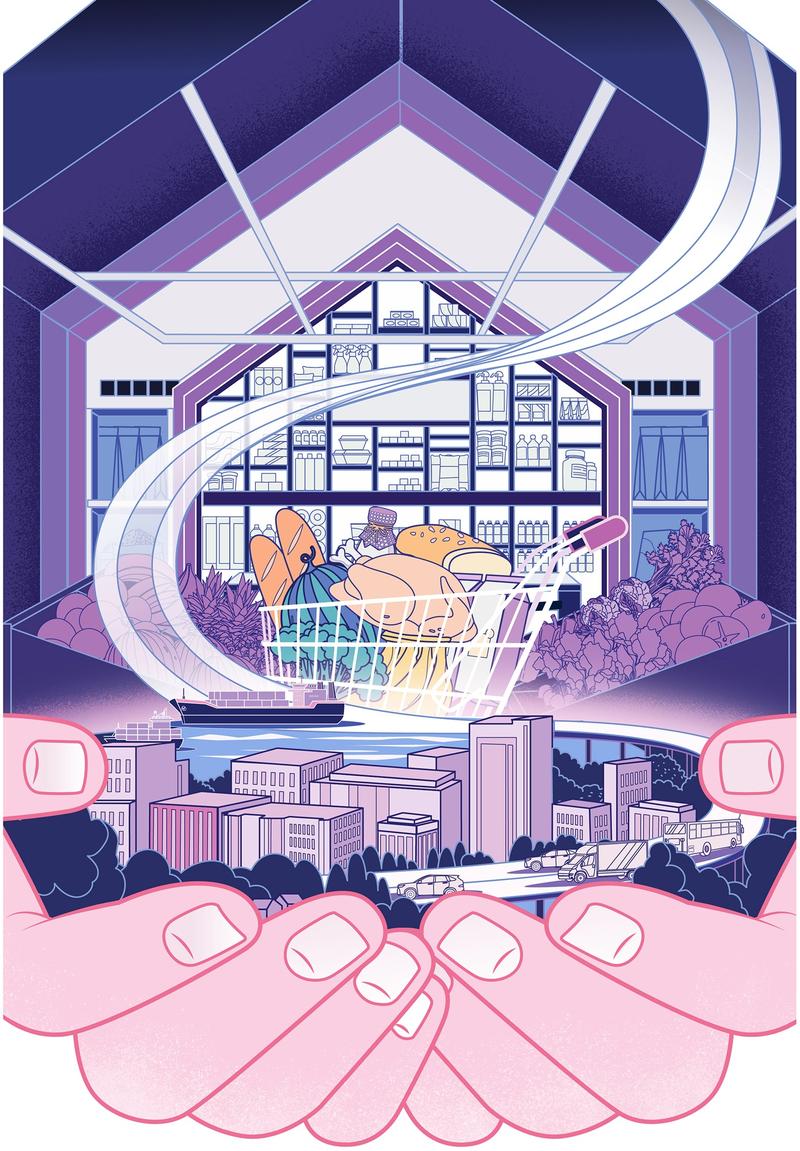Policies rolled out to maintain flow of goods as outbreaks threaten supplies
 (SHI YU / CHINA DAILY)
(SHI YU / CHINA DAILY)
With COVID-19 lockdowns posing a threat to supply chains, China has adopted stronger measures to ensure unimpeded logistics-especially for daily necessities and key production materials-to shore up economic growth and protect public well-being.
As the country grapples with its biggest COVID-19 challenge since the early days of the pandemic, policymakers have bolstered steps to secure vital supply lines for businesses while putting in place measures to contain the virus.
All provincial regions, except for the Tibet autonomous region, have been hit by COVID-19 outbreaks since March 1. As of April 19, there had been more than 500,000 infections in March and April, according to the National Health Commission.
Wu Chungeng, head of the Department of Road Transportation at the Ministry of Transport, told a news conference on April 19 that measures to contain outbreaks adopted by local authorities have clogged up truck routes in some areas and choked off supplies, heaping pressure on the domestic supply chain.
He gave highways as an example. On April 18, traffic volume was down 39.46 percent year-on-year. For trucks specifically, there was an 8.13 percent decrease over the same period.
The situation is particularly severe in the Yangtze Delta region-which includes Jiangsu, Zhejiang and Anhui provinces and Shanghai-where truck traffic declined 20.85 percent year-on-year.
Wu said the ministry has identified the key challenges facing the logistics sector, including sweeping policies that bar trucks from regions categorized as medium and high-risk, and the closing of highway toll stations and service areas.
To resolve gridlocks in the national transportation network, the central government has rolled out policies and convened special meetings to maintain the operations of the logistics sector.
In one document released on April 10, the Joint Prevention and Control Mechanism of the State Council, the Chinese Cabinet's COVID-19 body, pledged to ensure the orderly operation of key transportation networks.
The document warned local authorities against closing or blocking highways, roads or waterways, saying that ports, train stations, airports and highway service areas cannot be closed arbitrarily.
The outbreaks have already taken a toll on economic growth, as manufacturing activities contracted in March for the first time in five months.
The purchasing managers' index for the manufacturing sector stood at 49.5 in March, compared with 50.2 in February, data from the National Bureau of Statistics showed, declining after rising for four consecutive months.
Zhao Qinghe, a senior statistician with the NBS, said in a statement that logistical gridlocks in March delayed the shipment of goods, with suppliers facing their longest delays since March 2020-an indicator that manufacturing supply chain stability has been hit by the epidemic.
Premier Li Keqiang has underscored unimpeded logistics as a key factor underpinning the stability of commodity prices.
More coordinated measures must be taken to ensure the proper operation of key transport corridors and ports, and more targeted measures must be considered to help truck drivers and logistics operators and reduce costs, he said in a meeting earlier this month.
In another meeting with the governors of five provinces this month, Li called on authorities to give high priority to ensuring the orderly operation of key transportation networks and ports and to ensure the unimpeded operation of domestic and international logistics, while warning of mounting downward pressure facing the economy.
A document released on April 11 stressed the need to set up logistics distribution centers in areas hit hardest by the pandemic, and for truck drivers to be placed in closed-loop management to prevent the spread of the virus.
Local authorities must set up nucleic acid testing sites for truckers and provide catering for those stranded in areas under lockdown, or who are staying in highway service areas.
It urged financial institutions to prioritize both businesses and self-employed individuals in the logistics sector by offering inclusive loans and lowering interest rates.
Wu said the ministry will prioritize the supply of daily necessities and ensure smooth delivery to communities and businesses.
Other key measures include placing truck drivers under closed-loop management and issuing nationally recognized traffic passes.
The government will focus on ensuring unimpeded logistics in Shanghai, the epicenter of the latest outbreaks, and the Yangtze River Delta region, one of China's manufacturing powerhouses, he said.
As the Port of Shanghai is the world's largest container port, the outbreak has fueled worries about possible disruptions to global supply chains and foreign trade.
Wu said that about 25,000 workers at the port now operate in bubble environments to ensure normal operations and that port congestion has improved, even compared to the first two months of this year.
Li Cong, vice-president of Zongteng Group, an overseas warehousing and logistics provider, said the recent lockdowns have affected international supply chains, preventing many exporters from delivering products to the ports.
He said many exporters have had to shut down their factories, and the cost of international shipping is also at a historic high.
Zhang Guoqiang, a researcher at the National Development and Reform Commission's Comprehensive Transport Institute, said that ensuring unimpeded logistics is integral to the economy, and that the government must give greater policy priority to the growth of the sector.
"This is mainly because the sector is labor-intensive and highly competitive, which means that profit margins of businesses are very thin," he said, adding that the sector's importance to economic growth and the job market cannot be overstated.
In addition to protecting the logistics sector from the fallout of the lockdowns, the government should also extend tax cuts and fee reductions to the sector, he said.


